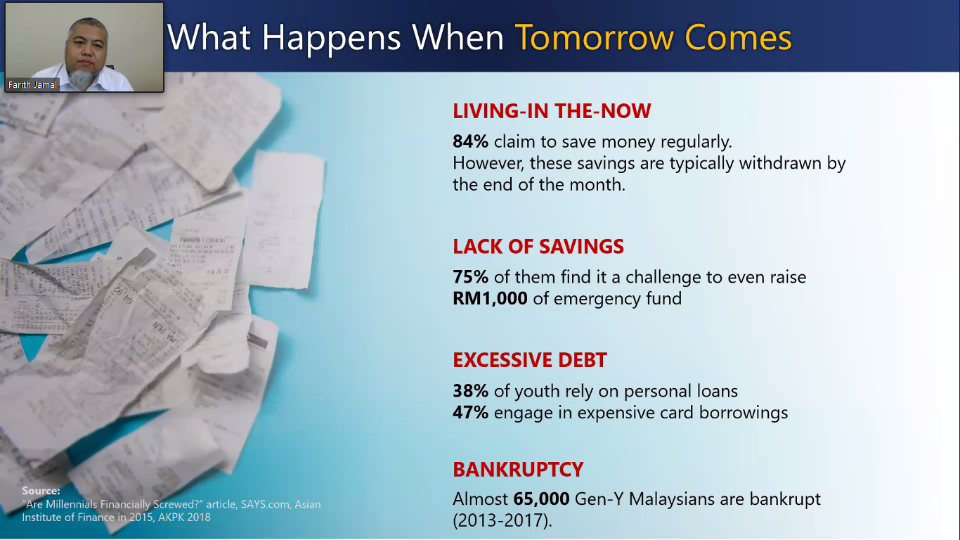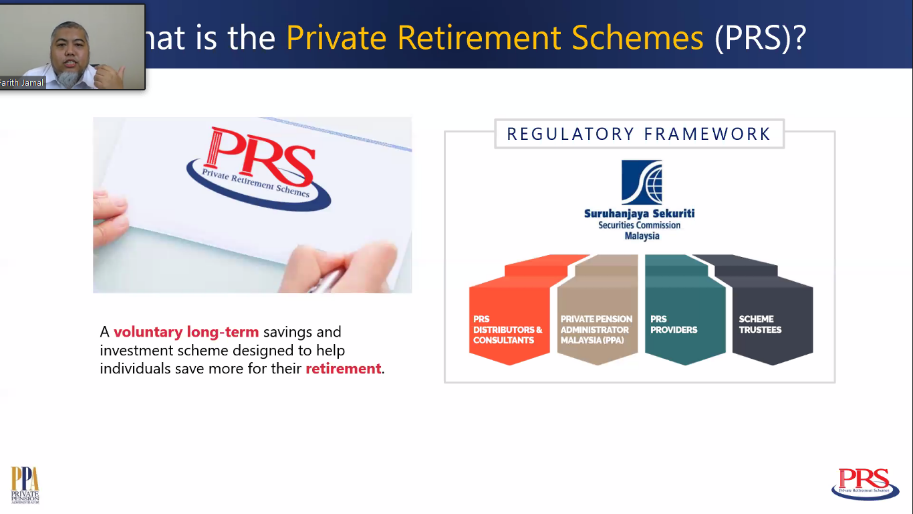

The event poster
It is no secret that fresh
graduates would often have financial problems as they tend to spend lavishly
instead of being frugal. This occurs especially after they receive their
first paycheck; enticed by the huge amount of money they get, young people
tend to splash their cash on expensive things immediately, rather than
saving it. This is a third-world problem for most fresh graduates in
Malaysia, which is why UTAR Faculty of
Accountancy and Management (FAM) and the Centre for Sustainable Development
and Corporate Social Responsibility in Business (CSDCSR) in collaboration
with Private Pension Administration Malaysia (PPA), the central
administrator for the Private Retirement Schemes (PRS) co-organised a
financial education webinar on 3 September 2020 via Zoom.
The talk, titled
"YOLO: You Only Live (Longer) Once – Want to Have
Enough When the Time Comes?",
was given by PPA PRS Learning and Engagement
Manager Farith Jamal. The webinar aimed to help the students and staff
recognise the importance of money management and retirement planning and
learn personal finance concepts applicable to savings and investing. Not
only that, the participants also had a deeper understanding of the framework
and features of PRS and its benefits for young adults, not to mention they
become increasingly familiar with PPA’s PRS online service.
Farith began the talk by defining
“YOLO” using a video clip, where it stated, “You Only Live Once”. “A lot of
young people like to live this way, as they believe that you should live in
the moment. They spend money on designer shoes, handbags, travel, the latest
phones and others. While this can be a good mindset to have, living like
this has proven to cause money stress. This is seen, as 84% of young people
claim to save money but these savings are regularly withdrawn at the end of
the month. Not only that, a lack of saving means that they constantly have
money problems, with a statistic showing that 75% of them find it difficult
to even raise RM1,000 for an emergency fund. Additionally, they tend to face
massive debts due to their reliance on personal loans and expensive card
borrowings. Worst of all, almost 65,000 Generation Y Malaysians are bankrupt
from 2013 to 2017 due to the lack of financial education,” lamented Farith.

Farith sharing the
problems faced by students
He pointed out that to ensure
money is not simply spent, one should understand their needs and wants. He
said, “One financial planning tip for youths to save money is by knowing
their wants and needs. The needs, more often than not, outweighs the wants,
as a person’s needs consist of basic necessities like food, water and
shelter. On the other hand, the wants are materialistic things that not
necessarily help a person in living, for instance, your videogames,
jewellery and travel. Nevertheless, lots of young people might accidentally
allow their wants to take over their needs, which is where their money is
wasted.” Farith then spoke about the two types of financial planning; short
and medium financial planning, which should be done by youths so that they
can save money. “When it comes to short-term financial planning, making a
budget would be the wisest option. A budget is a process of creating a plan
to spend money. Why is it good to have a budget in the short-term? It helps
to monitor your cash flow while ensuring your financial goals are on track.
It can also build good credit and help a person avoid debt. When making a
budget, one should also avoid inflate spending when beginning to work. For
medium-term financial planning, debt management is the best method to use.
There are two types of debt we can create, good and bad debt. The former is
a type of debt that can bring profits to us, like buying a house and renting
it to other people to use, while the latter refers to debts that cause the
value of the item to depreciate and generate high interest. I can tell you
five simple ways to avoid debt; firstly, review your budget, and next, start
an emergency fund that can help to pay debts and avoid interest. Also, do
not overdo it with credit cards and remember to pay on time. Last but not
least, do not take loans you do not need,” said Farith, when explaining the
types of financial planning.

Farith explaining
PRS
Moving on, Farith pointed out
another type of financial planning, which is long-term planning. For this
type of planning, he noted that a person should plan his or her budget for
their retirement. In order to have enough savings for the inevitable
retirement, he stated that a person needs at least 2/3 of their income, and
to get this amount, 1/3 of their monthly salary should be saved. Farith also
shared some tips with the participants on saving retirement money.
Afterwards, he touched on the most important aspect of the webinar, which is
the Private Retirement Schemes (PRS). “Private Retirement Schemes, or PRS,
can be defined as voluntary long-term savings and investment schemes that
are designed to help people save more for their future retirement, and it
even has its own regulatory framework. This framework comprises of five
parties; PRS distributors, PRS consultants, PPA, PRS providers and scheme
trustees. In the PRS account structure, your contributions will go into
either sub-account A or B. Seventy per cent of your contribution goes into A
and can be withdrawn upon reaching the legal retirement age, while the other
30% is transferred into sub-account B, and the money in it can be taken out
annually,” said Farith. He wrapped up the talk by explaining several other
details regarding PRS, including the ways Malaysians can fund retirement
savings and PRS can help close retirement savings gap, the eight types of
PRS providers, default option funds and others. He also taught the
participants the method to enrol into PRS online so that they too can start
saving for their retirement.

The Q&A session in
progress
The webinar ended with a brief Q&A
session.
Wholly owned by UTAR Education Foundation Co. No. 578227-M LEGAL STATEMENT TERM OF USAGE PRIVACY NOTICE